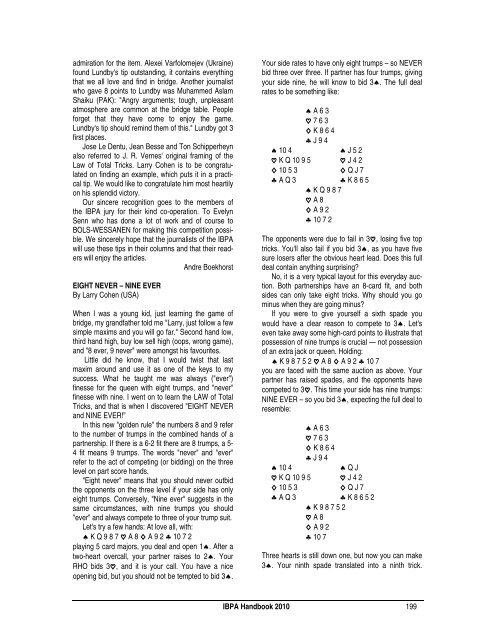Handbook - International Bridge Press Association
Handbook - International Bridge Press Association
Handbook - International Bridge Press Association
Create successful ePaper yourself
Turn your PDF publications into a flip-book with our unique Google optimized e-Paper software.
admiration for the item. Alexei Varfolomejev (Ukraine)<br />
found Lundby's tip outstanding, it contains everything<br />
that we all love and find in bridge. Another journalist<br />
who gave 8 points to Lundby was Muhammed Aslam<br />
Shaiku (PAK): "Angry arguments; tough, unpleasant<br />
atmosphere are common at the bridge table. People<br />
forget that they have come to enjoy the game.<br />
Lundby's tip should remind them of this." Lundby got 3<br />
first places.<br />
Jose Le Dentu, Jean Besse and Ton Schipperheyn<br />
also referred to J. R. Vernes' original framing of the<br />
Law of Total Tricks. Larry Cohen is to be congratulated<br />
on finding an example, which puts it in a practical<br />
tip. We would like to congratulate him most heartily<br />
on his splendid victory.<br />
Our sincere recognition goes to the members of<br />
the IBPA jury for their kind co-operation. To Evelyn<br />
Senn who has done a lot of work and of course to<br />
BOLS-WESSANEN for making this competition possible.<br />
We sincerely hope that the journalists of the IBPA<br />
will use these tips in their columns and that their readers<br />
will enjoy the articles.<br />
Andre Boekhorst<br />
EIGHT NEVER – NINE EVER<br />
By Larry Cohen (USA)<br />
When I was a young kid, just learning the game of<br />
bridge, my grandfather told me "Larry, just follow a few<br />
simple maxims and you will go far." Second hand low,<br />
third hand high, buy low sell high (oops, wrong game),<br />
and "8 ever, 9 never" were amongst his favourites.<br />
Little did he know, that I would twist that last<br />
maxim around and use it as one of the keys to my<br />
success. What he taught me was always ("ever")<br />
finesse for the queen with eight trumps, and "never"<br />
finesse with nine. I went on to learn the LAW of Total<br />
Tricks, and that is when I discovered "EIGHT NEVER<br />
and NINE EVER!”<br />
In this new "golden rule" the numbers 8 and 9 refer<br />
to the number of trumps in the combined hands of a<br />
partnership. If there is a 6-2 fit there are 8 trumps, a 5-<br />
4 fit means 9 trumps. The words "never" and "ever"<br />
refer to the act of competing (or bidding) on the three<br />
level on part score hands.<br />
"Eight never" means that you should never outbid<br />
the opponents on the three level if your side has only<br />
eight trumps. Conversely, "Nine ever" suggests in the<br />
same circumstances, with nine trumps you should<br />
"ever" and always compete to three of your trump suit.<br />
Let's try a few hands: At love all, with:<br />
♠ K Q 9 8 7 A 8 A 9 2 ♣ 10 7 2<br />
playing 5 card majors, you deal and open 1♠. After a<br />
two-heart overcall, your partner raises to 2♠. Your<br />
RHO bids 3 , and it is your call. You have a nice<br />
opening bid, but you should not be tempted to bid 3♠.<br />
Your side rates to have only eight trumps – so NEVER<br />
bid three over three. If partner has four trumps, giving<br />
your side nine, he will know to bid 3♠. The full deal<br />
rates to be something like:<br />
♠ A 6 3<br />
7 6 3<br />
K 8 6 4<br />
♣ J 9 4<br />
♠ 10 4 ♠ J 5 2<br />
K Q 10 9 5 J 4 2<br />
10 5 3 Q J 7<br />
♣ A Q 3 ♣ K 8 6 5<br />
♠ K Q 9 8 7<br />
A 8<br />
A 9 2<br />
♣ 10 7 2<br />
The opponents were due to fail in 3 , losing five top<br />
tricks. You'll also fail if you bid 3♠, as you have five<br />
sure losers after the obvious heart lead. Does this full<br />
deal contain anything surprising?<br />
No, it is a very typical layout for this everyday auction.<br />
Both partnerships have an 8-card fit, and both<br />
sides can only take eight tricks. Why should you go<br />
minus when they are going minus?<br />
If you were to give yourself a sixth spade you<br />
would have a clear reason to compete to 3♠. Let's<br />
even take away some high-card points to illustrate that<br />
possession of nine trumps is crucial — not possession<br />
of an extra jack or queen. Holding:<br />
♠ K 9 8 7 5 2 A 8 A 9 2 ♣ 10 7<br />
you are faced with the same auction as above. Your<br />
partner has raised spades, and the opponents have<br />
competed to 3 . This time your side has nine trumps:<br />
NINE EVER – so you bid 3♠, expecting the full deal to<br />
resemble:<br />
♠ A 6 3<br />
7 6 3<br />
K 8 6 4<br />
♣ J 9 4<br />
♠ 10 4 ♠ Q J<br />
K Q 10 9 5 J 4 2<br />
10 5 3 Q J 7<br />
♣ A Q 3 ♣ K 8 6 5 2<br />
♠ K 9 8 7 5 2<br />
A 8<br />
A 9 2<br />
♣ 10 7<br />
Three hearts is still down one, but now you can make<br />
3♠. Your ninth spade translated into a ninth trick.<br />
IBPA <strong>Handbook</strong> 2010 199


